What is SAP Business Technology Platform (Cloud Platform)?
SAP Business Technology Platform (BTP), formerly SAP Cloud Platform, is SAP's platform as a service (PaaS) product that provides a feature-rich development and runtime environment for building scalable, cloud-based enterprise applications. These applications tend to complement and extend organizations' SAP and non-SAP applications, both on-premises and on-demand.
SAP BTP provides numerous services for application integration, enterprise mobility, collaboration and analytics. It includes persistence powered by the SAP HANA database, which is an in-memory cloud platform that stores and processes data directly in the computer's RAM rather than from a hard disk. This speeds up data processing and application performance.
BTP is a PaaS operated by SAP that enables organizations to minimize infrastructure management and costs. SAP also offers quality of service features to BTP customers.
Uses of SAP BTP
SAP Business Technology Platform is designed to provide a secure, scalable development environment, tools and reusable platform services to help business users develop new cloud-based applications from scratch. BTP requires only a relatively small capital investment in software and hardware to start using the platform and build new cloud applications. These applications run in a modular and lightweight runtime container.
The platform is also suitable for developing on-premises system extensions. These extensions can then be seamlessly integrated with the relevant on-premises components using SAP Connectivity Service, which is a service to establish connections between cloud applications and on-premises systems, and SAP Cloud Connector, an application that creates a secure connection to enable the extension to communicate with on-prem systems.
Another use case for SAP Business Technology Platform is to develop cloud extensions. These extensions, which can be built for many other cloud applications and services, expand the existing functionalities of those applications. Some extensions also enable users to integrate the cloud service with other systems.
Finally, SAP BTP can be ideal for securely integrating cloud-based applications to on-premises SAP and non-SAP software. Customers can use the platform's connectivity service to set up these integrations.
Using SAP BTP with SAP HANA
SAP HANA, or High-Performance Analytic Appliance, is a multimodel, in-memory database. It is column-oriented, meaning that it stores data in column-based tables within RAM. Additionally, it combines online analytical processing, or OLAP, and online transactional processing, or OLTP, and has parallel execution capabilities. These capabilities enable faster transactions and data retrieval compared with other database management systems.
SAP HANA provides numerous development tools for multiple programming languages and data modeling techniques:
- SAP HANA Studio. An open source-based Eclipse development and administration tool to develop HANA-native applications.
- SAP Web IDE for SAP HANA. A browser-based integrated development environment for developing HANA-native applications with web-based or mobile user interfaces, business logic, and extensive SAP HANA data models.
- SAP HANA XSA. A comprehensive platform and embedded services for developing and executing microservice-oriented applications.
- SAP HANA Deployment Infrastructure. A service to deploy database development artifacts to lightweight, portable containers.
- SAP HANA Graph. A model that provides native support for graph processing and graph operations executed on the data stored in an SAP HANA system.
These and other tools -- along with SAP HANA programmatic interfaces -- enable business users to create comprehensive analytical models and build high-quality applications for SAP HANA.

SAP Business Technology Platform licensing models
The product now branded as SAP BTP is available in two commercial models: subscription-based and consumption-based. According to SAP, these options offer companies flexibility in matching BTP services with organizational needs.
Under the subscription model, customers get access to cloud services for a fixed price and for a defined time, and they can use as much of the service as they want. This model enables organizations to protect their IT investments with predictable costs.
Under the consumption model, customers can buy BTP services through credits and use them as they see fit. This setup enables companies to start and scale up development projects quickly whenever business requirements change. Customers purchase BTP credits upfront and keep a cloud credit balance for services used.
SAP Business Technology Platform SDK for Android
SAP BTP can be used to build enterprise-ready mobile native apps using its software development kit for Android. This SDK includes numerous frameworks, components, platform services and predefined user experience tools that simplify the development of Android-based apps. Developers can build the apps directly in Google's Android Studio. Key Android enterprise features available include managed configurations and Android management features such as work profile.
The SDK is tightly integrated with the SAP BTP Mobile Services Cockpit. Cockpit is a tool that helps app developers manage and monitor their apps. These can be native apps, cross-platform apps, web apps or mobile development kit clients.
The integration between the platform and Cockpit helps to ensure end-to-end integrated security for Android apps. It also enables developers to access core SAP ERP or SAP S/4HANA data and business processes, third-party data sources, and the available capabilities and services in SAP BTP.
Additionally, the SDK enables development teams to take advantage of SAP's enterprise service. They can leverage push notifications, diagnostics and security tools to streamline the development process and build enterprise-ready apps.

SAP Cloud Platform vs. SAP Business Technology Platform
SAP BTP is the rebranded avatar of SAP Cloud Platform, along with many enhancements. As SAP Cloud Platform, the offering provided cloud-based services for application development, integration and analytics. As SAP BTP, it goes several steps further by providing tools and services for the following:
- Application development.
- Process automation.
- Digital workspace development.
- AI agent deployment.
Thus, while SAP Cloud Platform only provided application development, integration and analytics, SAP BTP also provides an AI toolbox to enhance business productivity and enable business innovation.
Launched in 2021, SAP BTP enables businesses to integrate, automate, extend and build AI-powered business applications and processes. With this more powerful platform, enterprise users can do the following:
- Build smarter, contextual business and AI applications.
- Integrate and extend applications across finance, HR, supply chain and procurement.
- Automate processes with generative AI.
- Streamline complex, multistep workflows with collaborative AI agents.
SAP BTP provides prebuilt integrations and workflows as well as purpose-built frameworks for various kinds of applications. It is optimized for business processes across both SAP and non-SAP applications.
The platform is designed to provide all the necessary resources needed to create business applications for mission-critical business processes. Offering the ability to perform enterprise content management, automated testing, data analytics and application integration, SAP BTP can help companies unlock the full potential of their applications, AI and data.
SAP Cloud Platform vs. SAP HANA Enterprise Cloud
One of SAP's first PaaS products was SAP NetWeaver Cloud, released in 2012. This product was renamed SAP HANA Cloud Platform in 2013. In 2017, HANA was dropped from the name, and the platform became known as simply SAP Cloud Platform.
SAP Cloud Platform, now Business Technology Platform, shared a similar name with SAP HANA Enterprise Cloud (HEC), but the two platforms have different intents and purposes.
While BTP is a PaaS tool intended for developing and running cloud-based applications, HEC is a subscription-based cloud service and private cloud on the SAP S/4HANA environment. Many organizations use HEC as an extension of their existing on-premises infrastructure and to run SAP HANA applications in a managed cloud environment.
HEC provides the following:
- Managed private cloud service to host and run SAP HANA applications.
- Hosting capabilities for those applications.
- Relevant application, data and infrastructure services.
SAP HEC is an in-memory platform that improves app performance. It also removes redundances, improves data structures, and ensures tighter integration between applications and the underlying platform. Also, SAP optimizes the platform for every customer organization, which reduces the risks associated with complex migrations and replatforming.
SAP HEC is compliant with major data security and privacy regulations, improving security and compliance for enterprise users. It also provides greater flexibility and scalability, enabling companies to easily change their capacity requirements as business needs change.
As a managed private cloud service, SAP HEC is entirely responsible for managing the underlying infrastructure. Customer organizations don't need to be involved for most technical and management tasks. The only time they might need to get involved is to integrate the systems located in HEC into existing application lifecycle management processes.
Moving businesses to S/4HANA involves several risks, but it is also a great chance for digital transformation. Explore our definitive SAP S/4HANA migration guide, which includes information and best practices to ensure success. Also, see how the BBC structures app development with SAP Business Technology Platform.






